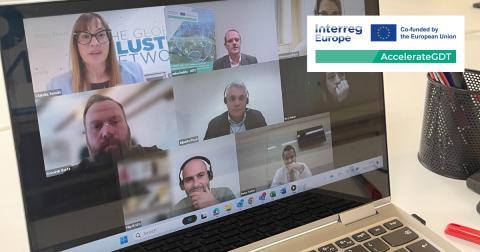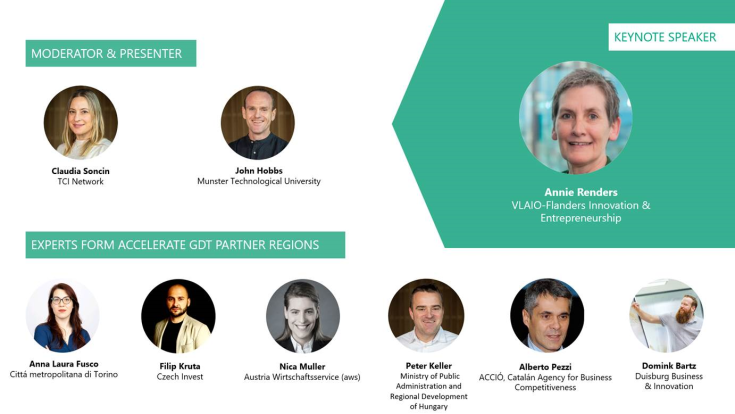Expert EU Cluster Policy Discussion
Accelerate GDT hosted a webinar ‘A Sustainability Journey into Cluster Policies in the EU,’ which brought together over 60 attendees from across the globe on 28-2-24, to compare and contrast 7 European Cluster Ecosystems, and expert panel discussion with interactive Q&A was held.
Claudia Soncin, TCI Network, believes discussion panels can bridge the gap for participants between our face to face meetings where participants can probe different elements of cluster programmes. She believes, “These types of discussion across Europe, are what will drive our shared learning journey and really allows our partner regions to make incremental changes to improve the impact of their programme and Policies over time.”
The knowledge sharing element of the webinar was broken into two parts, the first was a keynote from Annie Renders, Head of Unit Cluster Policy, VLAIO, Government of Flanders, who provided an excellent overview of the Flanders Cluster programme. After this, Claudia Soncin, TCI Network and John Hobbs, Munster Technological University led the sharing of the highlights and key learnings from the 7-partner region’s Cluster Ecosystem Analysis conducted within the Accelerate GDT project.
We were fortunate then to be joined by experts from each partner region to discuss cluster policy and their aspirations at a regional/national level for cluster programmes and initiatives. This panel was made up of Alberto Pezzi, ACCIÓ, Catalan Agency for Business Competitiveness; Anna Laura Fusco, Città Metropolitana di Torino; Nica Muller, Austria Wirtschaftsservice (aws); Peter Keller, Ministry of Public Administration and Regional Development of Hungary; Filip Kruta, Czech Invest and Dominik Bartz, Duisburg Business & Innovation.

Some really interesting questions and discussion probed the strong points, and highlights of the programs of supports for clusters. Alberto Pezzi, ACCIÓ highlighted the uninterrupted continuity of the Catalan Cluster Programme for more than 30 years; the continuous learning and evolution of the programme and the strength developed through letting the cluster support team from ACCIO specialise in cluster development, all of which have added to the success of the cluster supports in Catalonia.
Peter Keller, Ministry of Public Administration and Regional Development of Hungary head of the cluster unit showcased how the clarity in the cluster programme and how clustering has become a key element in the policy mix of supports from different departments being transformative for their National Cluster Policy in Hungary.
Other discussion topics included the actual need for a regional cluster strategy, since we have working examples in the Accelerate GDT project of regions that both have a long tradition of cluster strategies and others who have no targeted cluster strategy. There was large agreement from Filip Kruta, Czech Invest and Domink Bartz, Duisburg Business & Innovation that dedicated cluster policies and cluster units within government or local authorities could lead to more clarity around economic development through clusters and therefore more dedicated supports for example towards the green and digital transition, internationalisation or research and innovation. Clusters can be a conduit for government to connect and support groups of companies rather than individual 1-2-1 supports for same in some partner regions.
It was also extremely relevant to hear about the mixture of different cluster policy supports in Austria, where regions implement different cluster supports through a range of various mechanisms. Nica Muller, Austria Wirtschaftsservice (aws) was able to describe the different approaches in Styria, Lower Austria, Upper Austria, and Tyrol, each region implements very different programmes and funding mechanisms.
Anna Laura Fusco, Cittá metropolitana di Torino suggests that "One of the key aspects from which our regional clusters could benefit most is a proper and more structured regional cluster strategy and a regional centralised support, which we don't have yet - even if we’re the first Italian Region to rely on clusters. Co-learning will improve the relationship among the players in the whole local innovation ecosystem."
The discussion panel was enrichened by allowing attendees to interact directly with the panel and we were joined by Adam Priechodský, Společnosti Autoklastr; Emma Vendrell, ACCIO; Damien McConville, InterTradeIreland; Lucia Seel, Member of the European Cluster Expert Group of the European Commission and DEBUTING IE Project; Katrin Weittenhiller, IDEAM; Laura Sanchez, ACCIÓ and Luke Flynn, DETE.
To access resources from our webinar – click the links below:
- Recording of Sustainability Journey into Cluster Policies in the EU Webinar – Click Here
- Accelerate GDT Slide deck shared during the webinar – Click Here
- For access to all our regional Case Studies – Click Here
- Interreg Europe PLP Cluster Project and Resources Information – Click Here
